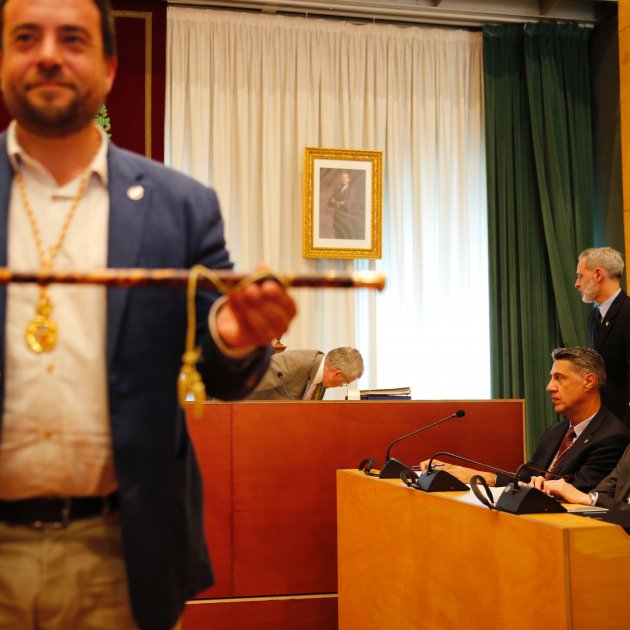Left-wing city councils have been constituted in most of the major city councils around Catalonia. Badalona, coastal city on the fringes of the Catalan capital, where at the last minute the socialist Àlex Pastor barred the door to former Partido Popular mayor Xavier García Albiol, offered the cherry on top of a left-wing triumph this Saturday as new mayors were voted in by municipal councils across Catalonia. The three big winners are all, at least nominally, on the left of the political spectrum but with three different positions on the all-important independence issue: the pro-independence Catalan Republican Left (ERC), the unionist Catalan Socialists (PSC) and the uncommitted Commons (EnComú). In some cases, ERC and PSC mayors replaced each other; in others, ERC politicians displaced the centre-right pro-independence party Together for Catalonia (JxCat), which had already lost support in the raw results of the municipal elections on May 26th, and now sees that decline confirmed in the post-election coalitions.
ERC did not, in the end, take the big prize of the Barcelona mayoralty, despite Ernest Maragall leading the most voted list on election night. Ada Colau will continue to occupy her office in Plaça Sant Jaume thanks to the votes of Jaume Collboni's PSC candidature, and, above all, of Manuel Valls, the Ciudadanos candidate who offered, "totally free of obligation", the three crucial votes that the BComú leader needed for an absolute majority, despite the two candidates' agreement in campaign debates that they disagree on almost everything, proposing models for the city that are diametrically opposed.
Progress for ERC, despite failure to take Barcelona
Having the Barcelona mayoral chair taken from under them is hard for ERC. But, nevertheless, the pro-independence centre-left party has for the first time achieved the mayoralties of two of the four major Catalan capitals: Lleida (Miquel Pueyo, with the support of JxCat and En Comú) and Tarragona (Pau Ricomà, in coalition with the Commons and with votes in favour from JxTarragona and the far-left CUP). Thus, both cities, long-time strongholds of the Catalan Socialists, now have pro-independence mayors, for the first time since the Spanish civil war.
As well, ERC heads left-wing majorities in which it has displaced the centre-right JxCat - its partner in the Catalan government - even though it hadn't won on election night, in emblematic cities such as Sant Cugat del Vallès, Figueres and Tàrrega. ERC has also won the mayoralty of Vilanova i la Geltrú, in this case to the detriment of the PSC, where Olga Arnaus has come to power with a tripartite pro-independence agreement: ERC-CUP-JxCat.
The power of the PSC
The PSC loses Lleida (Fèlix Larrosa) and Tarragona (Josep Fèlix Ballesteros). But, in addition to co-governing Barcelona with Colau, the Catalan Socialists have obtained mayoralties in 5 of the 11 Catalan cities with populations of over 100,000: L'Hospitalet de Llobregat, Badalona, Sabadell, Mataró and Santa Coloma de Gramenet.
This electoral recovery also allows the Socialists to strengthen its majorities in historical strongholds in the Barcelona metropolitan region, such as L'Hospitalet de Llobregat (Núria Marín), Santa Coloma de Gramenet (Núria Parlon) or Mataró (David Bote, who will govern with the Commons). Now, in addition, it adds Sabadell and, above all, Badalona, where the former left-wing mayor Dolors Sabater finally gave way to the more centrist Socialist Àlex Pastor to create a pact to bar the door to the PP's Albiol. The other side of the coin for the party is the inland city of Terrassa, where the former Socialist mayor Jordi Ballart, who resigned due to the PSC's support for the imposition of Article 155, returns as mayor with the votes of his new local group, Tot per Terrassa, and ERC.
JxCat, cornered
The post-electoral agreements have reduced the municipal strength of JxCat, the theoretical heirs to the large municipal empire of the former centre-right Catalanist party CiU. The only two cities of over 100,000 residents who will have a JxCat mayor are the southern city of Reus and the northern capital of Girona - where exiled president Carles Puigdemont was formerly mayor, and his successor Marta Madrenas will now lead a minority municipal government after failing to agree on a three-way pro-independence pact with the CUP and ERC. There is a third city that will have a JxCat mayor: Manresa. But only for one year. In the agreement reached, JxCat's Valentí Junyent will control the city for 12 months, whereupon ERC's Marc Aloy - who won the elections by just 10 votes - will take over for the other three years.
The centre-right independence party suffered fatal blows from ERC in key towns like Sant Cugat and Cervera. However, in Vic, JxCat's Anna Erra strengthened her majority, and in Igualada, the party's mayor Marc Castells win the election but will govern in a minority.
Photo: Àlex Pastor (PSC), new mayor of Badalona / Sergi Alcázar
